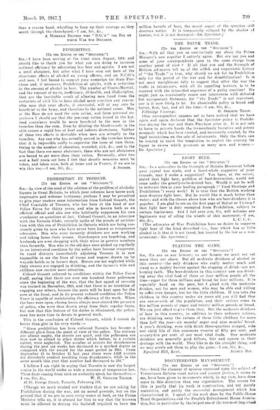PROHIBITION IN TORONTO. [To THE EDITOR Of THE " SPECTATOR."]
SIE,—III view of the need of the solution of the problem of alcoholic liquors in Great Britain, to which your columns have borne such impressive and welcome testimony, perhaps I may be permitted to give your_ readers some information from Colonel Grasett, the Chief Constable of Toronto, who has been at the head of our Police Force for thirty years, and who is known both as an efficient official and also one who habitually suppresses his own standpoint on questions of fact. Colonel Grasett, in an interview with the Toronto Globe, recently spoke of the proofs of satisfac- tion with this era of Prohibition in Ontario which are being con- stantly given by. men who have never been known as temperance - advocates. Men who were formerly drinkers are now working and taking home their money. Storekeepers are benefiting, and husbands are seen shopping with their wives in greater numbers than formerly. Men who in the old days were picked up regularly in an intoxicated condition by the police have become temperate. In rural districts immediately adjoining Toronto it is now impossible to see the lines of teams and wagons drawn up by wayside hotels as in former days. Horses are not neglected while their owners are engaged in drinking, and the farmer's wife and children now receive more attention.
Colonel Grasett referred to conditions within the Police Force itself, saying that there are over one hundred fewer policemen since the beginning of the war, that the last squad of recruits was trained in December, 1915, and that there is no intention of engaging any others, because the posts will be kept open for the ;nen at the front, and in its present reduced condition the Police Force is capable of maintaining the efficiency of the work. When he bars were open, closing hours always necessitated the presence of police, who were thus drawn away from their regular beats, but now that this feature of his duties is eliminated, the police- man has more time to devote to general work.
This is the conclusion of Colonel Grasett, which I cannot do better than give in his very words:- " Since prohibition has been enforced Toronto has become a different place from the point of view of the police. The stations are almost empty, the streets are quiet, and the policemen are free now to attend to other duties which before, to a certain extent, were neglected. The number of arrests for drunkenness (luring the past six weeks has decreased to a marked degree as compared with the record for the same period in 1915. From September 15 to October 15 last year there were 1,059 arrests for disorderly conduct resulting from drunkenness, while in the same month this year that number had decreased to 214."
I believe I am right in saying that Toronto is now the largest eentre in the world under so wide a measure of temperance law. These facts coming from such an authority speak for themselves.—
Lihough we nitt5t remind our readers that we are asking for Prohibition during the war, net on moral grounds, but on the ground that if we aro to save every ounce of food, as the Prime Minister tells us, it is absurd for him to say that the brewers must be allowed to destroy the foodstuff required to brew ton
million barrels of beer, the moral aspect of the question still deserves notice. It is temporarily eclipsed by the shadow cf famine, but it is not destroyed.—ED. Spectator.]


































 Previous page
Previous page